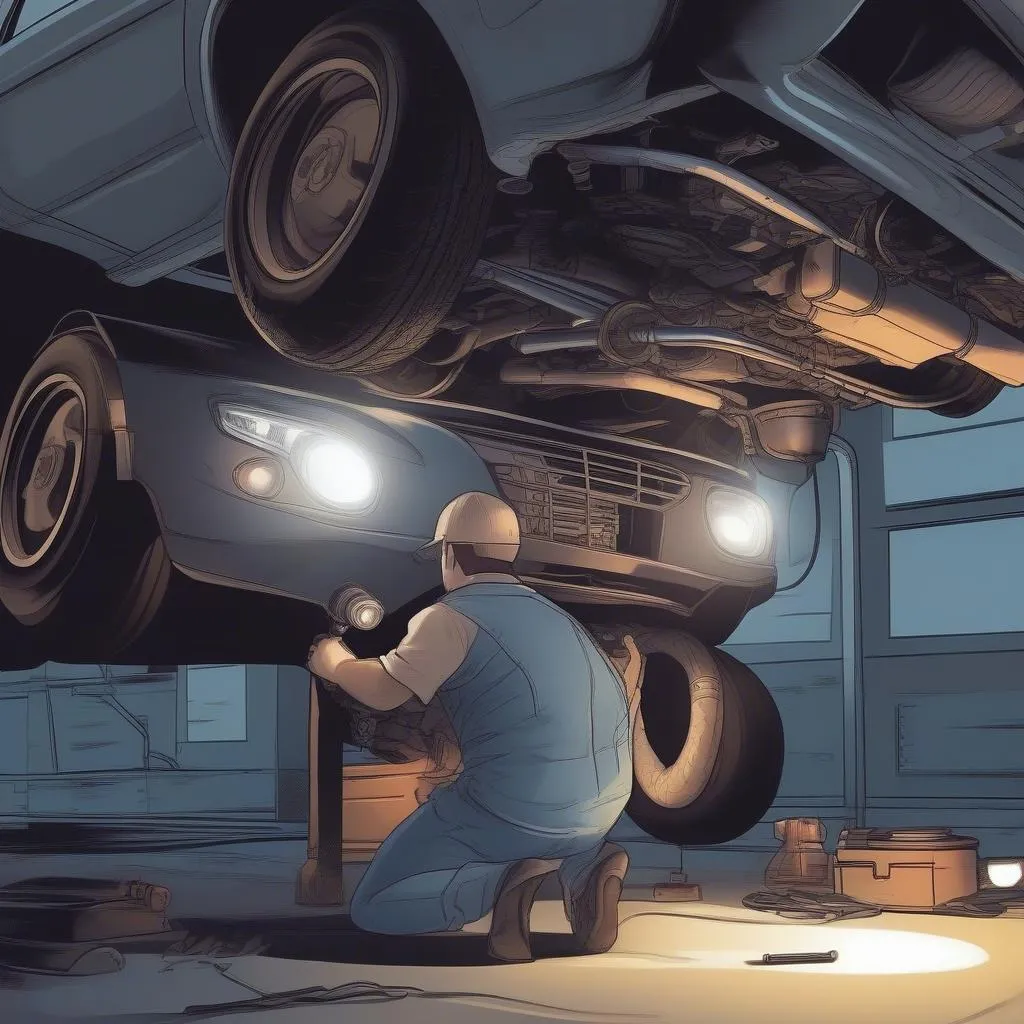Imagine this: you’re cruising down the Pacific Coast Highway, California sun warming your face, the wind in your hair… and suddenly, your car starts shaking like a rock concert mosh pit. Not exactly the peaceful road trip you envisioned, right?
“Why is my car shaking?” is a question that echoes in the minds of countless car owners, often accompanied by a sense of dread and confusion. And you’re not alone! Understanding the reasons behind those unwanted vibrations can save you from costly repairs and unnecessary stress down the road.
Decoding the Shakes: What Your Car is Trying to Tell You
As a seasoned mechanic with years of experience under the hood, especially with European cars and their intricate electrical systems, like those requiring a Dealer Scanner, I’ve seen it all. From minor tremors to full-blown shimmies, car shaking can signal a range of issues, some simple, others more complex.
Let’s break down the possible culprits:
1. Engine Problems: The Heart of the Matter
Your engine is the beating heart of your car, and just like a heart with an irregular rhythm, a struggling engine can make its presence known through vibrations.
- Spark Plugs Gone Wrong: Worn-out or faulty spark plugs can disrupt the combustion process, causing your engine to misfire and, you guessed it, shake.
- Fuel System Hiccups: A dirty fuel filter or a malfunctioning fuel injector can throw off the air-fuel mixture needed for optimal combustion, leading to engine shakes, particularly when accelerating.
- Internal Engine Issues: While less common, more serious problems like worn engine mounts, a failing timing belt, or even internal engine damage can manifest as vibrations. These require immediate attention from a qualified mechanic.
2. Tire Troubles: Finding Your Balance
Tires are your car’s connection to the road, and even slight imbalances can throw off your smooth ride.
- Wheel Alignment Issues: Remember that pothole you hit last week? It might have knocked your wheels out of alignment, leading to vibrations, especially at higher speeds.
- Unbalanced Tires: Just like a washing machine on spin cycle with an uneven load, unbalanced tires can cause vibrations that worsen as you accelerate.
- Tire Wear and Tear: Worn-out tires, uneven tread wear, or even a bulge in the sidewall can compromise your car’s stability and lead to those dreaded shakes.
3. Brake System Blues: A Shaky Stop
While less common than engine or tire issues, problems with your braking system can also be the culprit behind car shakes.
- Warped Brake Rotors: Over time, brake rotors (the discs that your brake pads clamp down on) can become warped or unevenly worn, causing vibrations when braking, especially at higher speeds.
- Stuck Brake Caliper: If a brake caliper (the component that houses the brake pads) gets stuck, it can create friction and vibrations, even when you’re not actively braking.
 car shaking road trip
car shaking road trip
From Shakes to Solutions: Regaining Control of Your Ride
Now that we’ve explored the potential reasons behind your car’s shaking, let’s talk solutions. Remember, diagnosing and fixing car problems requires specialized knowledge and tools. Always consult with a trusted mechanic, especially if the shaking is severe or accompanied by other warning signs.
1. Regular Maintenance is Key: Prevention over Panic
Just like regular check-ups keep you healthy, routine car maintenance is crucial for preventing many common car problems, including those that cause shaking. This includes:
- Regular Oil Changes: Clean oil keeps your engine running smoothly and can prevent premature wear and tear.
- Spark Plug Replacement: Follow your car manufacturer’s recommended maintenance schedule for spark plug replacement to ensure optimal engine performance.
- Tire Rotations and Balancing: Regular tire rotations and balancing help distribute tire wear evenly and prevent imbalances that can lead to vibrations.
2. Addressing Specific Problems: Targeted Solutions
If your car is already shaking, here’s what you can do:
- Engine Issues: For suspected engine problems, a mechanic will likely run a diagnostic test using a scanner, like a Dealer Scanner for European Cars, to pinpoint the source of the issue. This might involve inspecting spark plugs, fuel injectors, or checking for error codes related to the engine control unit.
- Tire Troubles: A tire professional can inspect your tires for wear and tear, check wheel alignment, and balance your tires to restore a smooth ride.
- Brake System Problems: If you suspect brake issues, a mechanic can inspect your brake rotors and calipers for wear and tear and recommend necessary repairs or replacements.
 mechanic inspecting car
mechanic inspecting car
Don’t Ignore the Shakes: Your Car’s Cry for Help
Remember that story about the road trip down the Pacific Coast Highway? Imagine if the driver had ignored the car’s shaking, assuming it was nothing major. It could have led to a breakdown, ruining the trip and potentially putting everyone at risk.
Just like you wouldn’t ignore persistent shaking in your own body, don’t ignore the signs your car is trying to send you. Addressing car problems early can save you time, money, and potential headaches down the road.
Have Similar Questions? We’ve Got You Covered!
Curious about other car mysteries? Check out these related articles:
- Why is my car shaking when I start it?
- Engine Shaking: Causes and Solutions
- Car Shaking Over 60? Here’s What to Check
Need expert advice or assistance with diagnostic tools? Don’t hesitate to contact us via WhatsApp at +84767531508. Our team of automotive experts is available 24/7 to help you get back on the road smoothly and safely.